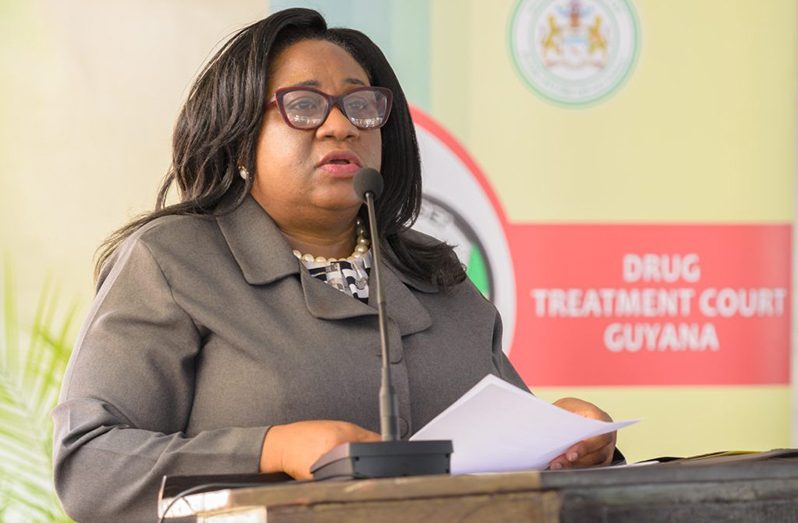– Outlines legal protections, justice process
THE Guyana Association of Women Judges (GAWJ) held a live panel discussion on Thursday to sensitise citizens about the transnational criminal activity of trafficking in persons (TIP) and what role the judiciary plays in justice for survivors.
The discussion was GAWJ’s first in a series of activities for World Day Against TIP, which is being held under the theme: “Use and abuse of technology.”
The global focus this year is on the role of technology as a tool that can both enable and impede human trafficking.
During the panel discussion on radio station 104.1FM, Christel Lambert, a magistrate at Bartica, Region Seven (Cuyuni-Mazaruni) who is also the second vice-president of the GWJA, gave an overview of the Combatting Trafficking in Persons Act 2005, including the guidelines for sentencing and related criminal offences.
Based on our local legislation, TIP is defined as the act of recruitment, transportation, harbouring, transfer, and receipt of persons by the use of force, strength, or other forms of conversion, for the specific purpose of exploitation.
TIP crimes also entail sexual exploitation, forced labour, servitude, slavery and practices similar to slavery.
It is also connected with other criminal activities such as the drug trade, money laundering, smuggling of gold and other items out of the country, illegal trading of firearms, and other criminal activities.
The TIP law covers the unlawful withholding of a person’s identification card, and transporting and harbouring a person for the purpose of trafficking.
Additionally, it requires that hearings for TIP offences be held in camera and that the identity of the victim must not be published.
Any person who exposes the identity of the victim and the victim’s family commits a summary offence and is liable to a fine of $100,000.
The Bartica-based magistrate made reference to Chapter Three of the Act which states that under a summary conviction, a person can be sentenced to three to four years in jail, be subjected to forfeiture of property, and can also be ordered to pay full restitution to the victim.
However, if convicted on an indictable charge which requires a High Court trial, the person can be sentenced to life in prison, along with forfeiture of property and restitution to the victim.
In the case involving a trafficked person who is under the age of 18, five years may be added to the sentence. Additionally, if the convicted person commits a sexual assault against a trafficked person, five years may be added to the sentence.
In 2019, the Chief Magistrate and President of GAWJ Ann McLennan, sentenced a businesswoman to 15 years in jail for trafficking two Venezuelan women for the purpose of sexual exploitation. Her sentence was handed down in accordance with the TIP Act.
“The legislation is worded in such a way to impose severe penalties on those persons that are convicted for this deplorable crime,” Magistrate Lambert told listeners during the morning programme.

Against this backdrop, she said that victims are protected in such a way so that they are not prosecuted while being heard for certain types of offences that they may have engaged in while being trafficked, such as immigration-related activities.
“So, we would like persons who are victims out there and maybe undocumented in our country to know that they will not be prosecuted and they should not be afraid to come forward,” the magistrate said.
Meanwhile, the chief magistrate highlighted the best practices which are implemented when dealing with TIP criminal cases.
She explained that the court’s role is to conduct a victim-centred, trauma-informed speedy trial, which aims at avoiding re-victimization throughout the entire process.
“The security of the victim is particularly important because of the nature of these offences, which involve syndicates. And a number of persons are involved in the crime. That is the reason for a rigorous bail hearing,” she said.
The victim will also be paired with an advocate, who is required to report directly to the prosecutor about the psychological state of the victim.
The prosecutor will report to the magistrate on the status of their files and readiness to proceed along with what forms of special measures are needed for the victim and all the witnesses.
At the trial, the matters are held privately, whereby only concerned parties are allowed in the courts. Additionally, the victim’s family member or advocate will also be allowed into the hearing for emotional support.
As part of their second event, GAWJ will be distributing 150 TIP posters in all of the administrative regions, especially in areas where the crime is prevalent.
According to the US Department of State 2021 Trafficking in Persons Report, Guyana has managed to maintain its Tier One ranking for its local response to TIP.
The tier-ranking means that the Government of Guyana has fully met the minimum standards for elimination of trafficking. Guyana is among just four South American countries to have achieved this status.
The US Department of State 2022 TIP Report states, “The Government of Guyana fully meets the minimum standards for the elimination of trafficking. The government continued to demonstrate serious and sustained efforts during the reporting period, considering the impact of the COVID-19 pandemic on its anti-trafficking capacity; therefore, Guyana remained on Tier 1.
“These efforts included identifying more victims and referring them to services, increasing investigations and prosecutions, drafting and funding a National Action Plan (NAP) for 2021-2025 with input from survivors, training diplomats, and conducting a campaign to inform migrants of the Spanish-language hotline.”
Additionally, Guyana has improved its capacity to collect information and report on suspected cases of trafficking, conduct undercover operations, provide support to victims to rebuild their lives, and/or facilitate their repatriation when requested.
Ongoing public awareness programmes are conducted in foreign languages and some Indigenous languages.
Recent initiatives include offering a bilingual anti-trafficking 24-hour hotline to assist Spanish-speaking victims, and the development of standard operating procedures for victim identification.
There has also been progress in dismantling some criminal networks in Guyana involved in trafficking.
Government shelters offer specialised care for victims, including training, translation, legal and medical services, and psychological therapy.
The government also provides financial support to shelters managed by civil society organisations, while direct financial and other assistance are provided to victims who opt not to stay in a shelter.



.jpg)








